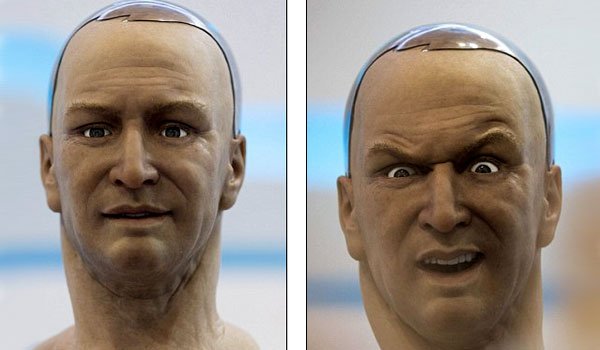The humanoid, known as Ham, has been drawing in crowds with his incredible range of facial expressions at an electronics event in Hong Kong this week.
The head, designed by American robotics designer David Hanson, is able to answer basic questions and can also be used in the simulation of medical scenarios.
Ham is currently on exhibit at the Global Sources spring electronics show at AsiaWorld Expo - the largest event of its kind in the world, with more than 4,000 booths displaying the latest gadgets
The head is created with malleable material called Frubber using soft-bodied mechanical engineering and nanotechnology.
It contains realistic pores that measure just 4 to 40 nanometers across (there are 10million nanometers in one centimetre).
Using specialised software the machine can recognise and respond to a number of human facial expressions in a natural way.
According to Hanson Robotics's website, the humanoids can actually see your face, make eye contact with you, and understand speech to 'engage you in witty dialogue'.
Such reactions are a major feat of engineering, according to chief designer David Hanson, the founder and and president of Hanson Robotics.
It is not the first human-looking robot that his firm has created either. An earlier version of Ham drew headlines as it was sculpted to look like Albert Einstein, complete with a bushy moustache and a shock of white hair.
The Einstein humanoid made facial expressions by using multiple motors - which whir into action and subtly adjust multiple points of articulation around his mouth and brown eyes.
Mr Hanson sees robotics as his calling and works on many fronts, from sculpting features to developing artificial intelligence.
To advance to the next step of producing robots for everyday applications in entertainment, health care and education, he decided to move to Hong Kong with his family - his wife Amanda and their son Zeno.
The city has a booming robotics community with a high amount of expertise and design infrastructure and new technology can be developed at a lower cost than in the US.
(Pics and Source - Daily mail)






